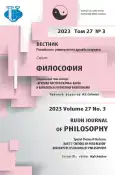Receptions of Kant’s Philosophy in Russian Empiriocriticism
- Authors: Rybas A.E.1
-
Affiliations:
- Saint Petersburg State University
- Issue: Vol 27, No 3 (2023): KANT’S “CRITIQUE OF PURE REASON” AND WAYS OF ITS READING BY PHILOSOPHERS
- Pages: 582-597
- Section: KANT’S “CRITIQUE OF PURE REASON” AND WAYS OF ITS READING BY PHILOSOPHERS
- URL: https://journal-vniispk.ru/2313-2302/article/view/325238
- DOI: https://doi.org/10.22363/2313-2302-2023-27-3-582-597
- EDN: https://elibrary.ru/GSOONC
- ID: 325238
Cite item
Full Text
Abstract
The article analyzes the influence of Kantian philosophy on the problems and development of Russian empiriocriticism. It is shown that the critical pathos of Kant’s philosophy, as well as his call for intellectual honesty in philosophy, was appreciated first of all. Relying on Kant, Russian empiriocritics proved the inconsistency of metaphysics in both its religious and materialistic forms. In addition, the teachings of the founders of empiriocriticism, E. Mach and R. Avenarius, were also criticized because some dogmatic assumptions were found in them. Attempts to eliminate these assumptions resulted in a dynamic concept of experience, based on which the concepts of empiriomonism (A. Bogdanov), empiriosymbolism (P. Yushkevich), scientific philosophy (V. Lesevich), positive philosophy of life (S. Suvorov), positive aesthetics (A. Lunacharsky), ethics of mutual joy (A. Bogdanov) and many others were developed. Special attention was paid to the analysis of the “thing-in-itself” since this very concept of Kantian philosophy was used by G. Plekhanov to justify “orthodox” Marxism. Russian empiriocritics opposed Plekhanov’s identification of the “thing in itself” and the material object, arguing that the concept of matter is a metaphysical assumption and, for this reason, cannot contribute to refuting dualism and Kantian “agnosticism.” From the monistic point of view, the “thing-in-itself” should be understood on the basis of experience as a necessary form of its organization. According to Bogdanov, there is nothing a priori in the “thing-in-itself”; this idea appeared as a result of substituting the known for the unknown and expressed a process rather than essence. Kant’s aesthetics and moral philosophy were also actively discussed in Russian empiriocriticism. The interpretation of beauty as “expediency without purpose” was extended to the fundamental principle of the “aesthetic worldview,” which gave credibility to the doctrine of the ideal, the practice of social construction, etc. As a result of the polemic with the ethics of compassion, of which Kant was considered the most authoritative defender, an alternative ethic of mutual joy was created. Thus, the influence of Kantian philosophy on Russian empiriocritics was complex and contributed to the development of new ideas.
About the authors
Aleksandr E. Rybas
Saint Petersburg State University
Author for correspondence.
Email: a.rybas@spbu.ru
ORCID iD: 0000-0003-2120-2667
Candidate of Sc. in Philosophy, Associate Professor, Department of Russian Philosophy and Culture, Institute of Philosophy
7-9 Universitetskaya Emb., 199034, Saint Petersburg, Russian FederationReferences
- Bogdanov AA. Empiriomonism: Articles on Philosophy. Moscow: Respublika publ.; 2003. (In Russian).
- Bogdanov AA. Philosophy of Living Experience: Materialism, Empiriocriticism, Dialectical Materialism, Empiriomonism, Future Science. Popular Essays. Moscow: Krasand publ.; 2010. (In Russian).
- Berdyaev NA. Philosophical truth and intellectual pravda. In: Milestones. Intelligentsia in Russia: A Collection of Articles 1909-1910. Moscow: Molodaya Gvardiya publ.; 1991. P. 24-42. (In Russian).
- Lesevich VV. What is Scientific Philosophy? Saint Petersburg: I.N. Skorokhodova publ.; 1891. (In Russian).
- Lesevich VV. The First Predecessors of Positivism. In: Russian Positivism: Lesevich, Yushkevich, Bogdanov. Saint Petersburg: Nauka publ.; 1995. P. 55-106. (In Russian).
- Bogdanov AA. Belief and Science (Concerning the Book of V. Ilyin “Materialism and Empiriocriticism”). In: The Fall of Great Fetishism: Modern Crisis of Ideology. Moscow: Krasand publ.; 2010. P. 142-220. (In Russian).
- Yushkevich PS. Modern Energeticism from the Point of View of Empiriosymbolism. In: Russian Positivism: Lesevich, Yushkevich, Bogdanov. Saint Petersburg: Nauka publ.; 1995. P. 107-164. (In Russian).
- Steila D. Human Activity and Truth: Early Russian Marxists and Pragmatism. Voprosy Filosofii. 2012;(1):129-143. (In Russian).
- Steila D. Plekhanov’s Theory of Knowledge and its Philosophical Origins. In: Buzgalin AV, Pruzhinin BI., editors. Marxism in Russia: Georgy Valentinovich Plekhanov, Vladimir Ilyich Ulyanov (Lenin). Moscow: ROSSPEN publ.; 2013. P. 23-48. (In Russian).
- Plekhanov GV. Notes to the book by F. Engels “Ludwig Feuerbach..”. In: Selected Philosophical Works, in 5 vols. Vol. 1. Moscow: Gospolitizdat publ.; 1956. P. 453-498. (In Russian).
- Plekhanov GV. Materialism Once Again. In: Selected Philosophical Works, in 5 vols. Vol. 2. Moscow: Gospolitizdat publ.; 1956. P. 442-447. (In Russian).
- Soboleva M. A. Bogdanov und der philosophische Diskurs in Russland zu Beginn des 20. Jahrhunderts. Zur Geschichte des russischen Positivismus. Hildesheim: Georg Olms Verlag; 2007.
- Lunacharsky AV. Suicide and Philosophy. In: Suicide: Collected articles. Saint Petersburg; 1911. P. 67-92. (In Russian).
- Lunacharsky AV. Fundamentals of Positive Aesthetics. In: Essays on the Realist Worldview: A Collection of Articles on Philosophy, Social Science and Life. Saint Petersburg: Montweed publ.; 1905. P. 114-179. (In Russian).
- Kant I. Critique of Practical Reason. In: Critique of Practical Reason. Saint Petersburg: Nauka publ.; 1995. P. 121-258. (In Russian).
- Kant I. Metaphysics of Morals. In: Critique of Practical Reason. Saint Petersburg: Nauka publ.; 1995. P. 259-505. (In Russian).
- Bogdanov AA. The New World. In: Problems of Socialism: Works of different years, Moscow: Politizdat publ.; 1990. P. 28-89. (In Russian).
- Lunacharsky AV. Review: “H. Geffding. Philosophical Problems”. Obrazovanie. 1904:3(3):125-130. (In Russian).
Supplementary files









